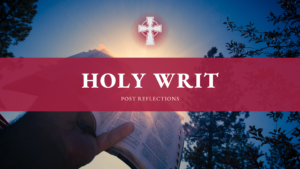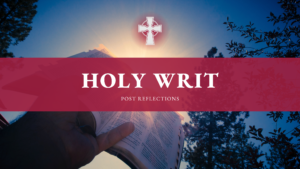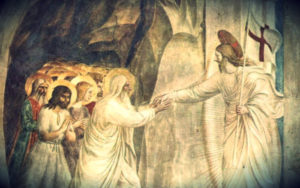
O Lord, our heavenly Father, Almighty and everlasting God, who hast safely brought us to the beginning of this day; Defend us in the same with thy mighty power; and grant that this day we fall into no sin, neither run into any kind of danger; but that all our doings, being ordered by thy governance, may be righteous in thy sight; through Jesus Christ our Lord. Amen.
“Good Morning” Images of God
Christians were made liturgical and symbolic images of the invisible God. How can this be seen? Because all cultures and all peoples say, “Good morning.”
What do I mean? How does saying “good morning” reflect the image of God? Why is it that every tribe, tongue, and nation recognizes the goodness of seasons, days, and years and feels the need to mention it to everyone in sight as a common gesture? This is because all cultures, irrespective of their beliefs, acknowledge the goodness of seasons, days, and years by saying “good morning” or any other similar greeting. It’s a bit odd.
Seeing Liturgical and Symbolic Images in The Hobbit
Let’s look to The Hobbit for introspection:
Good morning!” said Bilbo, and he meant it. The sun was shining, and the grass was very green. But Gandalf looked at him from under long bushy eyebrows that stuck out further than the brim of his shady hat.
“What do you mean?” he said. “Do you wish me a good morning, or mean that it is a good morning whether I want it or not; or that you feel good this morning; or that it is a morning to be good on?”
“All of them at once,” said Bilbo. “And a very fine morning for a pipe of tobacco out of doors, into the bargain.
In the quoted passage above, Bilbo joyously greets Gandalf with a “Good morning!” Gandalf, however, responds with a question, asking what Bilbo means by his greeting as if to investigate what he means. Bilbo’s jovial attitude and response are that he is quite content in all of the possible interpretations at once and that it is a very fine morning for enjoying a pipe of tobacco out of doors. Perhaps this is one instance where Gandalf would have said, “Hobbits are fascinating creatures. I have been studying them for a long time (The Fellowship of the Ring, Book One, Chapter 2).
Saying “good morning” and “good evening” is a liturgical act. It is an ancient echo from the eternal that calls and beacons the creatures who bear His image. Saying good morning is a ritual we say to dearest loved ones and complete strangers. It binds us all to the goodness of creation by speaking and acknowledging the goodness of it. It jars us when someone doesn’t wish us a good morning back. In so doing, they have broken the enchantment and union that knits us all together.
Echoing God’s Words in Our “Good Morning”
3 And God said, “Let there be light,” and there was light. 4 And God saw that the light was good. And God separated the light from the darkness. 5 God called the light Day, and the darkness he called Night. And there was evening and there was morning, the first day.
I think we can learn from the exchange between Gandalf and Bilbo that “good” in good morning is the Light that God notices in creation. God loves repetition. And “Good Morning” reminds us of the Father’s only begotten Son and His work.
The Necessary Light–the Son of God
9 The true light, which gives light to everyone, was coming into the world. 10 He was in the world, and the world was made through him, yet the world did not know him. 11 He came to his own, and his own people did not receive him.
Without the light, the true Light, there is no morning, there is no evening; Most importantly, there is no longer good.
By proclaiming the simple “Good Morning” as His body, we allow our light to shine before men.
14 “You are the light of the world. A city set on a hill cannot be hidden. 15 Nor do people light a lamp and put it under a basket, but on a stand, and it gives light to all in the house. 16 In the same way, let your light shine before others, so that they may see your good works and give glory to your Father who is in heaven.”
God repeats Himself in saying “Good Morning” in the liturgical act of Genesis 1-2:1. This act of creation is repeated in Holy Writ in the setting up of the Tabernacle, in the rebuilding of the temple, and the coming of the promised Messiah all repeat this very same liturgical act in Genesis. Christ worked for six days proclaiming the Kingdom of God, rested on the seventh day in the grave, and was raised to newness of life on the eighth day of His resurrection. A new creation. From the new creation, we look back at the beginning chapters of Genesis with child-like enjoyment. Every time God says “Good”, He is saying, “Look at my beloved Son in whom I am well pleased”.
A wonderful quote from a wonderful saint speaking on eternal childlikeness in such a way:
“Because children have abounding vitality, because they are in spirit fierce and free, therefore they want things repeated and unchanged. They always say, “Do it again”; and the grown-up person does it again until he is nearly dead. For grown-up people are not strong enough to exult in monotony. But perhaps God is strong enough to exult in monotony. It is possible that God says every morning, “Do it again” to the sun; and every evening, “Do it again” to the moon. It may not be automatic necessity that makes all daisies alike; it may be that God makes every daisy separately, but has never got tired of making them. It may be that He has the eternal appetite of infancy; for we have sinned and grown old, and our Father is younger than we.”
― G.K. Chesterton, Orthodoxy
In reflecting on the liturgical act of creation and the repetition of the phrase “Good” throughout Scripture, we gain wisdom of the eternal nature of God. As we acknowledge the true Light, the Son of God, and allow our light to shine before others by simply saying “good morning”, we participate in this divine act of creation and reflect the eternal vitality and childlike spirit of our Heavenly Father. G.K. Chesterton’s words remind us that, unlike us, God delights in the monotony of creation and finds joy in the simple act of saying “Good Morning.” Through our faith and obedience, we have the privilege of participating in this divine work and bringing glory to our Father in heaven, who is forever young and full of life.
Coram Deo:
From the same mouth come blessing and cursing. My brothers, these things ought not to be so. (James 3:10)
Be vigilant about how you start your day before God and before man. A great man and a great Puritan, Thomas Watson, said, “Every time you draw your breath, you suck in mercy.” Remember that by rejoicing in the small things. Rejoice in saying “good morning” to all men. Rejoice in the smell of freshly ground coffee beans and sizzling bacon, rejoice in working out early and taking a cleansing shower from your toil, rejoice in your morning alarm, rejoice in your morning prayers and devotion to God. Last of all, rejoice in the forgiveness of sins, a fresh start every sunrise.
Related Resources
Our Mission
To multiply faithful servants of Christ; who will commit themselves to the worship and doctrines of the Anglican way, and who will work by God's grace and for His glory to disciple the nations through the ministry of the Church.









